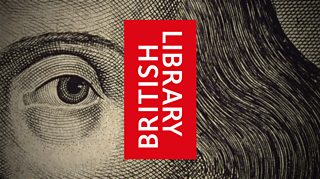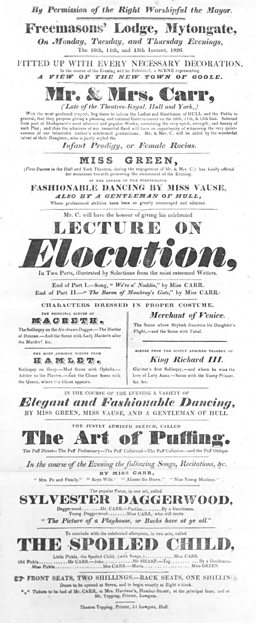Hull's emerging theatre scene adores Shakespeare
Play-going was popular in Hull – from fishermen to wealthy merchant families who flocked back to the port after the summer.
-
![]()
Much ado near me
Hear more Shakespeare stories on BBC Radio Humberside
-
![]()
Shakespeare Festival 2016
The BBC celebrates the genius of the bard

The growth of provincial theatres
Hull was part of a circuit that included York, Wakefield and Pontefract. It had gained a Theatre Royal back in 1769 – one of the first cities in England to do so outside of London.

Until that time, strict government regulations controlled the numbers of official theatre venues. These controls began in 1737 with the Licensing Act which was introduced by the then Prime Minister Robert Walpole, after his government became the subject of numerous satires on the London stage.
It meant that all new plays must be submitted to the Lord Chamberlain for ‘examination’ (censorship) and that theatre could only be staged in theatres which held an official patent. London’s Covent Garden and Drury Lane theatres were the only venues which could legally stage Shakespeare’s plays.
In practice local magistrates turned a blind eye to the rules and allowed performances by travelling acting companies to continue.
But as provincial towns and cities like Hull grew bigger, so did the demand for permanent playhouses outside of London to be established. A select few, such as Hull, were issued patents by act of Parliament. It was a sign of great prestige, and the Theatres Royal – as they became known – attracted top London stars when they went on tour.
Theatre Royal Hotel Hull

Old Humber Theatre
The theatre featured on this playbill, the Old Humber Street theatre, opened its doors on 1 May 1810 (but not with a Shakespeare performance). It was described in a tourist guide as one of the best buildings of the kind out of London.
Here the actor Mr Jefferson has organised his “benefit” night – this means that the actor can keep the money raised at the door, once the wages and overheads for the company are paid off.
He can also choose the play and the role he plays… so here’s the dilemma: Should an ambitious, lesser-known actor like Mr Jefferson cast himself in a leading role and risk low returns at the box office? Or should he give the lead to a star performer, who would attract the crowds and bolster the takings?
It was an interesting judgement call. Mr Jefferson made his decision. Tonight he is Hecate, one of the witches in this “melodramatic” adaptation of Macbeth, and a more established and better known actor, “Mr S Butler” plays the lead, Macbeth.
We don’t know if the gamble paid off but every effort has been made to attract spectators.
The benefit has the approval of the Mayor – who may be in the audience – and viewers are carefully taken through the plot of the drama, to whet their appetite and familiarise them with what unfolds on stage (though as one of Shakespeare’s most popular plays at this time they would probably be familiar with the plot).
The scenes are described with suitable melodramatic fervour, and the author is at pains to reassure us that the evil are punished, and the virtuous are rewarded.
Although the theatre was to enjoy many an entertainment in the following years, sadly it was destroyed by fire in 1859.
An alderman called John Symonds remembered standing shivering outside its doors when he was a young boy, eager to cadge a ticket from someone leaving the performance early. When he talked to the press about the ruin of his pet place of amusement, he turned to Shakespeare to sum up his sense of loss:
“The cloud-capped towers, the gorgeous palaces,
The solemn temples, the great globe itself,
Yea, all which it inherits, shall dissolve,
And like the baseless fabric of a vision,
Leave not a wrack behind.”
(The Tempest, Act IV Sc 1)
(Source for quotes – Alderman Edited and reprinted in Kingstoniana, 1889 – reprinted in Evolution of the Drama in Hull and District by Thomas Sheppard, A Brown and Sons Ltd, 1927)
Shakespearean Variety Night in Hull, 1826-style
This performance was staged at the Freemasons Lodge, at Mytongate in Hull, at the behest of the Mayor.
On the bill, rather than one play, there’s a selection of scenes from Shakespeare’s “most admired and popular works”.
This gave actors a chance to display their versatility – Macbeth (murder), Hamlet (madness), The Merchant of Venice (venality), and Richard the III (the wooing scene, so a bit of love interest plus the pathos of the Princes).
Spectators would recognise and enjoy the familiar scenes, a bit like a modern day audience would be enthralled by the trailers in a cinema.
This way of presenting Shakespeare proves the esteem – almost veneration – in which the national bard is held.
“Admirers of our Immortal Bard will have an opportunity of witnessing the very quintessence of our Inimitable author's celebrated productions” – says the theatre manager, selling his big night.
Shakespeare, enveloped by lectures, songs, sketches and dancing, fulfils the evening’s intellectual aspirations. (There is even a reference to a scene featuring a view of the new town of Goole!)
The performers are Mr and Mrs Carr, visiting actors who have performed in the region, at the York and Hull theatres. With them is their daughter, the “Infant Prodigy” or “Female Roscius” – a title which actors often appropriated as it refers to a Roman actor of renown, so conferred gravitas on the performer.
This way of presenting Shakespeare proves the esteem – almost veneration – in which the national bard is held.
About Shakespeare on Tour
From the moment they were written through to the present day, Shakespeare’s plays have continued to enthral and inspire audiences. They’ve been performed in venues big and small – including inns, private houses and emerging provincial theatres.

BBC English Regions is building a digital picture which tracks some of the many iconic moments across the country as we follow the ‘explosion’ in the performance of The Bard’s plays, from his own lifetime to recent times.
Drawing on fascinating new research from Records of Early English Drama (REED), plus the British Library's extensive collection of playbills, as well as expertise from De Montfort University and the Arts and Humanities Research Council, Shakespeare on Tour is a unique timeline of iconic moments of those performances, starting with his own troupe of actors, to highlights from more recent times. Listen out for stories on Shakespeare’s legacy on your BBC Local Radio station from Monday 21 March, 2016.
You never know - you might find evidence of Shakespeare’s footsteps close to home…
Craig Henderson, BBC English Regions

Origins of Mr and Mrs Carr
This performance's origins are with the actor David Garrick who worshipped the dramatist, although it didn’t stop him altering his work as he saw fit.
In September 1769 he organised a Jubilee at Stratford-Upon-Avon to celebrate the playwright’s life and although the rain turned the festival into a wash-out, he wrote a play about the event.
The Jubilee was staged around the country. It proved so popular that over the following years more flattering works about the life of Shakespeare or the “Immortal Bard” appeared. The expression coined for these expressions of feverish adulation was 'bardolatry'.
In 1826 the spectators in Mytongate enjoyed their own version of the genre in front of the Mayor and local masons.
Related Links
Shakespeare on Tour: Around Humberside
-
![]()
A wealthy host attracts Shakespeare's actors to Yorkshire
Shakespeare’s King’s Men visit the Clifford family at Londesborough Hall
-
![]()
The first black Shakespearean actor performs in Hull, the bastion of the anti-slavery movement
Ira Aldridge performed as 'The African Roscius', after a famous Roman actor.
-
![]()
Shakespeare: The Hull Connection
Who is the mysterious John Jackson?
Shakespeare on Tour: Around the country
-
![]()
Whitby, wealth and a Shakespearean bachelor night
The Bachelors of Whitby sponsor a performance of Merchant Of Venice
-
![]()
A new king and rebranded Shakespeare’s players head first for Shrewsbury
James I established the ‘King’s Men’ as his official group of theatre players
-
![]()
Shakespeare's men perform before the King at Wilton in Salisbury
A royal audience in Salisbury
-
![]()
Caludon Castle: Did Shakespeare perform here for ‘Henry the Harmless’?
Was Shakespeare there during the 1593 'Plague Tour'?









